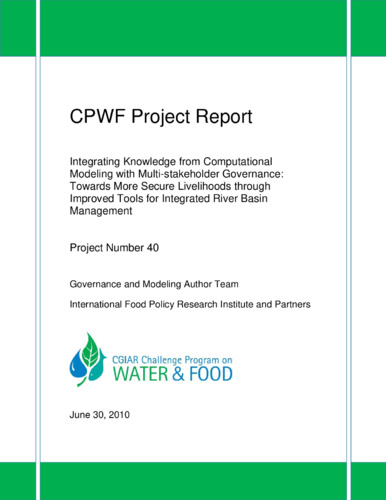Integrating knowledge from computational modeling with multi-stakeholder governance: Towards more secure livelihoods through improved tools for integrated river basin management
Abstract
The research project “Integrating Governance and Modeling” used advanced modeling techniques to assist policy-makers and stakeholders in Ghana and in Chile to use water resources more effectively for agricultural development and poverty reduction. In Ghana, research was conducted in the White Volta Basin, which represents an early stage of river basin development. In Chile, the Maule basin was chosen as a case of advanced basin development. The two cases represent the Volta and the Andes benchmark basins of the Challenge Program on Water and Food.
The project also revealed that even though investing in small-scale reservoirs is a promising strategy to expand access to irrigation in Northern Ghana, this strategy is confronted with major governance challenges. A survey conducted under the project showed that out of 19 small reservoirs constructed with substantial donor funding between 2000 and 2006 in the Upper East Region of the country, only 3 were in fact used for irrigation. Problems in procurement and construction of the reservoirs were identified as major problems, next to shortcomings in the required technical expertise. The findings of the project suggest that donor agencies—before investing in new small reservoirs—should urgently address these problems, for example by strengthening the accountability of contractors and the irrigation administration to local water user organizations and their elected representatives.
The project also led to the development of Net-Map, an innovative method for research and organizational development, which combines social network analysis with participatory mapping techniques. Net-Map, which is easy to use, makes it possible to identify, visualize and understand how different stakeholders can better interact with each other to achieve their desired outcomes.

